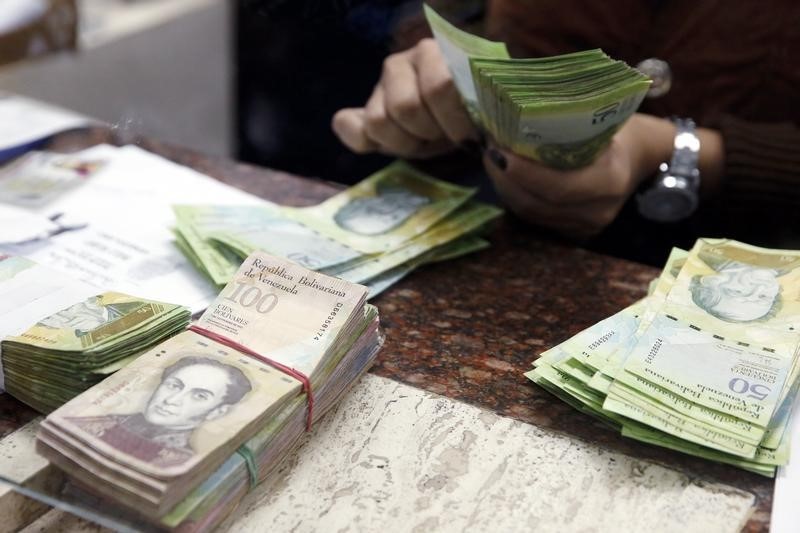By Brian Ellsworth, Dena Aubin and Tim McLaughlin
CARACAS/NEW YORK (Reuters) - A growing number of U.S. companies say they can't cope with Venezuela's sinking bolivar currency, prompting some of them to remove their operations in the South American nation from their consolidated financial reports. In other cases, they have exited the country altogether through a sale or by simply shuttering their businesses there.
Many of those recently taking such action are medium-sized or small companies, which means that the tumbling currency and a deeply troubled Venezuelan economy have tended to have a disproportionately greater impact on their results than suffered by bigger entities with business in the country.
The restructuring moves can shield the financial results of parent companies such as batteries and razors maker Energizer Holdings, automated teller machine and bank vault provider Diebold Inc and printing and publishing company RR Donnelley & Sons from Venezuela's economic troubles. But they can also signal that the Venezuelan business is no longer regarded as worth fighting for, and support from the American headquarters cannot be counted on.
Deconsolidating Venezuelan operations, for example, is an accounting maneuver that means the business in that country can no longer hurt or benefit a parent company's financial results. Often companies are taking a big one-time charge so that they can ring fence what is left in Venezuela.
"There's something about a deconsolidated subsidiary, even though you may own all or a majority of it, that makes management regard it as much more of a third party than ownership would imply," said veteran Wall Street accounting and tax expert Bob Willens, who now runs his own firm.
The socialist government of President Nicolas Maduro forced some companies to take drastic measures through a 70 percent devaluation of the bolivar in February via a newly-created currency system known as Simadi. Authorities now provide dollars to state-run companies and a select group of private businesses at a preferential rate of 6.3 bolivars, mainly for priority goods such as medicine, but also sell the U.S. currency at a rate of nearly 200 for many other goods. The bolivar's black market rate is even weaker – at almost 302 to the dollar on Wednesday - according to the website dolartoday.com.
The disbursement of dollars at the much more favorable official rate has been slashed as last year's oil price plunge left the OPEC nation with less oil revenue. U.S. companies of all sizes are scrambling to obtain hard currency to import raw materials and machine parts.
VENEZUELA HAS "LEFT THE BUILDING"
Not even U.S. companies that supply Venezuela with vaults and armored trucks are safe from a Venezuelan currency whose exchange rate now more closely tracks the black market.
"From a business point of view, Venezuela has basically left the building," Diebold Inc Chief Executive Andreas Mattes recently told analysts and investors. "There is no rational way for us as management to get our arms around a country where you have absolutely no access to your currency and the currency itself is artificially being lowered in very short intervals."
Diebold recently ended its direct involvement in Venezuela by selling its equity interest in a joint venture there. The company is now using an indirect sales model to continue to service its customers. But Venezuela results will no longer affect Diebold's consolidated financial statements.
Some companies may be tired of Venezuela's instability, but find it hard to leave market share that took decades to establish.
"It's just not in their DNA to walk away from market share," said Kenneth Miller, a partner at accounting firm PricewaterhouseCoopers.
But some can.
Auto parts company Dana Holding Corp, which makes vehicle powertrains, completed its divestiture in Venezuela after operating in the country for more than 40 years, Dana spokesman Jeff Cole said. Metal container supplier Silgan Holdings Inc ceased operations in the country at the end of 2014, walking away from about $20 million in annual revenue.
St. Louis-based Energizer decided to deconsolidate its operations in Venezuela and took a $144.5 million charge for the quarter as a result, including the write-off of investments in the Venezuelan business and currency-related losses. This led to it reporting a net loss of $88.5 million for the period.
RR Donnelley sold its 50.1 percent stake in a Venezuelan venture at the end of April and said it will take a net loss of about $15 million in the second quarter as a result. It had already taken a loss for the currency decline in the first quarter.
U.S. companies face a myriad of problems in Venezuela, from weak demand to shortages of many goods, difficulty in importing parts and products. They also have to get government approval before raising prices.
As Reuters reported in February, at least 40 major U.S. companies had about $40 billion in exposure to Venezuela's deepening economic crisis, and could collectively be forced to take billions of dollars of write downs.

Currency controls often lead to shortages, resulting in long lines at supermarkets as consumers scramble for even basic products such as milk and toilet paper. Automakers such as Ford Motor (NYSE:F) Co have had to reduce or halt vehicle assembly because of a lack of parts, and the company's workers this week said the firm will begin to price its vehicles in dollars in order to maintain operations.